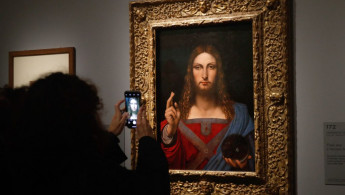Renowned art expert 'willing' to head to Saudi to uncover mysteries of Salvator Mundi
A renowned British art historian has expressed his "willingness" to travel to Saudi Arabia to inspect the $450-million-dollar Salvator Mundi painting, which is shrouded in mystery
The world’s most expensive artwork, owned by the Gulf kingdom, is thought to be a Leonardo da Vinci original. However, heated speculation among art experts has cast doubt over its authenticity.
The piece, once believed to be destroyed, was bought in 2017 by a little-known Saudi prince, who was reported to be a proxy for Crown Prince Mohammed bin Salman, Saudi Arabia's de facto ruler.
Martin Kemp, an art historian at the University of Oxford who originally attributed the work to da Vinci, told journalists that Saudi Arabia made "moves" to get him to visit the Kingdom and look at the historic painting.
"It is in Saudi Arabia and the country is constructing an art gallery, which is to be finished in 2024…there have been moves to get me out to look at it," said Kemp, according to The Times.
The art expert added that he was "slightly reluctant" to go "for very obvious reasons" - in what appeared to be unsubtle reference to Saudi Arabia’s poor human rights record.
Saudi authorities have recently jailed citizens for over 30 years for mildly critical tweets.
"But if it helps to get Salvator Mundi out into the fresh air then I would be willing to do that," he said.
When asked if he believed the painting was a da Vinci, Kemp said he was "confident" it was one, but that he could not say "every brushstroke was by Leonardo".
The 500-year-old painting was reportedly hung on Crown Prince Mohammed's megayacht before it was taken to Paris for display.
However, the French government refused to showcase the artwork in the Louvre as "100 percent Leonardo da Vinci". This was despite alleged pressure from Riyadh to get Paris to authenticate da Vinci as the sole creator, rather than a contributor.
Madrid’s acclaimed Prado museum has also challenged statements which attribute the painting only to the renaissance icon.
Kemp said that perhaps da Vinci - while commissioning and envisioning the work - assigned one of his students to complete brushstrokes for Salvator Mundi.





 Follow the Middle East's top stories in English at The New Arab on Google News
Follow the Middle East's top stories in English at The New Arab on Google News


